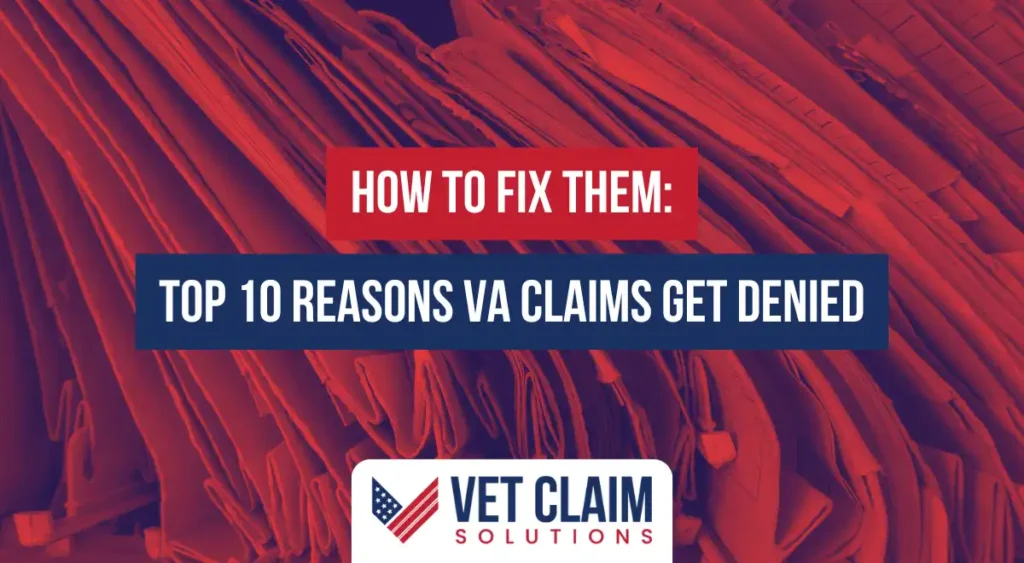Receiving a VA claim denial letter can be deeply disappointing. You’ve honorably served your country and now face health challenges stemming from that service. A denial for your disability claim can leave you wondering, “Why?”
It’s certainly a tough situation when the VA denies disability claims. However, there’s a positive side: many va disability claim denials can be successfully challenged and overturned. The crucial part is understanding the reasons for the denial and the steps to take next to secure your va benefits.
This article focuses on the Top 10 Reasons VA Claims Get Denied — and How to Fix Them. It breaks down common errors and outlines how to strengthen an appeal or supplemental claim, guiding you to the disability compensation you earned through your military service.

Common Roadblocks: Why VA Claims Face Denial
So many veterans feel lost when their va claim is denied. It often comes down to a few key areas where things might have gone off track in the va claims process. Don’t lose hope, though; understanding these common reasons for a disability claim denial can illuminate the path to a successful appeal or a new, stronger va disability claim.
1. No Current Medical Diagnosis
You might feel the effects of an injury or illness every single day from your time in service. But if there isn’t a formal diagnosis, a current medical diagnosis, in your records, the VA can’t connect it to your service. They need a doctor to officially state, “Yes, this person has this specific diagnosed condition right now.”
The VA requires this formal diagnosis to confirm the existence of a disability. Without it, even if symptoms are present, the claim lacks a fundamental building block. This is often one of the first things a VA rater looks for when reviewing claims filed.
How to Fix It: Your first step is to see a doctor. Get a clear, current diagnosis for your condition, whether it’s sleep apnea or another ailment. Make sure this diagnosis is well-documented in your medical records, ensuring medical records updated reflect your present state.
If you’re filing a supplemental claim, this new medical evidence is crucial. Your doctor’s report should clearly state your condition and, if possible, comment on its chronicity and severity. You can learn more about evidence requirements by reviewing information about evidence for your VA claim on the VA’s official site.
Ensure your medical records updated clearly outline the history and ongoing treatment for the diagnosed condition. A vague or outdated diagnosis makes it difficult for the VA to grant service connection.
2. The Missing Link: No Clear Nexus to Service
This is a significant hurdle for many veterans disability claims. The VA needs to see a clear link – they call it a “nexus” – between your current disability and your time in military service. Simply having a condition isn’t enough; it must be demonstrated that your service caused it or made an existing one worse.
Without this connection evidence, the VA cannot legally grant disability benefits, even if your disability is severe. The nexus establishes that the government is responsible for compensating you for the condition. This is particularly important for conditions not presumptively linked to service.
How to Fix It: This is where a “nexus letter” from a medical professional, preferably a specialist in the relevant field, can be invaluable. This detailed nexus letter should explicitly state it’s “at least as likely as not” (a 50% or greater probability) that your service caused or aggravated your condition. Buddy statements from fellow service members who witnessed an injury, event, or symptom onset during service can also help build this bridge.
Think about what happened during your service that could have led to your current problem and gather any service connection evidence. Dig into your service medical records for any related treatments or complaints, as these can form the basis of a clear link. A strong, detailed nexus is often the key to overturning a va claim denial based on lack of service connection.
Consider obtaining an Independent Medical Opinion (IMO) if your private doctor is hesitant or unfamiliar with writing nexus letters. These specialized opinions directly address the legal standard the VA requires.
3. Not Enough Medical Evidence
Sometimes, you have a diagnosis and a potential link, but the VA feels the medical evidence is insufficient or not strong enough. They might need more details about your symptoms, treatment history, the frequency and severity of flare-ups, or how the condition impacts your daily life. The VA wants to see a consistent story told by your medical records, demonstrating ongoing treatment and the current impact of the condition.
Insufficient medical evidence is a common reason va denies disability claims. The VA requires robust evidence showing the condition’s current state and its effects. Simply mentioning a condition once in your records from years ago may not be enough.
How to Fix It: Gather every piece of medical evidence you can find, creating a comprehensive file. This includes records from military doctors, private physicians, specialists, hospital stays, therapy sessions, and any diagnostic test results. The more detailed and comprehensive your medical history related to the condition, the better your chances.
If there are gaps in treatment or documentation, try to fill them with current examinations or statements from your doctors explaining the progression of your condition. Ensuring medical records updated regularly helps. Detailed lay statements from family, friends, or former colleagues describing the visible impact of your disability can also provide additional evidence showing its severity.
Focus on obtaining sufficient medical evidence that clearly documents the onset, persistence, and functional limitations caused by your disability. This includes objective findings and your subjective complaints over time.

4. Oops. Missed Deadlines or Incomplete Forms
Paperwork can be a significant challenge in the va claims process. It’s easy to miss deadlines for submitting forms or additional evidence the VA requested. Filling out forms incorrectly, leaving sections blank, or failing to sign documents can also lead to a swift denial of your disability claim.
These are technicalities, but they matter a great deal to the VA. Missed deadlines can mean your claim is closed without a full review on its merits. Incomplete forms can cause delays or prevent the VA from understanding the full scope of your claim.
How to Fix It: Pay very close attention to all deadlines the VA provides. Mark them on a calendar and set reminders. Double-check every form before you submit it; make sure every question is answered thoroughly and all required signatures are present.
They can often review your paperwork before submission. Using the VA’s official forms page can help you get the right documents and current versions. Submitting everything on time and complete prevents unnecessary va claim denial reasons from arising.
Keep copies of everything you send and note the date it was sent. This meticulous record-keeping can be vital if there are disputes about timeliness or receipt of documents. Many veterans find using certified mail with a return receipt provides peace of mind.
5. Condition Not Considered Service-Connected by VA Rules
Some conditions have specific rules about service connection defined in VA regulations. For example, certain chronic conditions must appear within a specific timeframe after service (usually one year, but it varies) to be presumptively service-connected. If your condition, like some forms of Agent Orange exposure related illnesses or certain Gulf War illnesses, falls outside these rules or isn’t on a presumptive list, the VA might deny it if direct service connection isn’t clearly established.
The VA operates under a complex set of laws and regulations (Title 38, Code of Federal Regulations). If your claim doesn’t fit neatly into these rules, it can be denied even if you believe your service caused the issue. Understanding these specific rules is crucial.
How to Fix It: Research the VA’s rules for your specific condition. If it’s a presumptive condition, confirm you meet all criteria, such as service in a specific location and timeframe, and the manifestation of the condition to a compensable degree. If it’s not presumptive, you’ll need strong direct evidence, like a solid, detailed nexus letter and service records showing the event, injury, or disease onset during your military service.
This is where clearly understanding the VA’s requirements can guide your evidence gathering strategy. Sometimes, a condition can be service-connected on a secondary basis if it’s caused or aggravated by an already service-connected condition.
For instance, if a service-connected knee injury leads to arthritis in that knee, the arthritis can be claimed as secondary. Exploring all avenues for service connection is important.
6. Pre-Existing Condition Not Clearly Worsened by Service
If you entered service with a pre-existing condition, you can still get VA disability benefits if your military service made it worse (aggravated it) beyond its natural progression. However, you must clearly show this aggravation. If the VA doesn’t see that clear link between service and the worsening, they might deny the claim for aggravation of a pre-existing condition.
The VA presumes a veteran was in sound condition when they entered service unless defects were noted at enlistment. If a pre-existing condition was noted, the burden is on the veteran to show it was permanently worsened by service. This is different from the natural progression of an illness or injury that would have occurred anyway.
How to Fix It: You need medical evidence demonstrating that your condition worsened specifically because of your service, not just that it deteriorated over time. This could be medical opinions comparing your condition before and after service, or after a specific in-service event or injury. Highlight any service medical records that show treatment or complaints about the worsening condition during your service.
A medical professional’s opinion should detail how military duties, specific incidents, or the overall environment of service caused a permanent increase in disability. For example, if you had mild asthma before service, and service in a dusty environment led to chronic, severe asthma, that would be aggravation. Without clear evidence showing the impact of military service, the VA denies such claims.
Focus on providing documentation that contrasts the severity of the condition at entry into service versus its severity at separation or currently, linking the increase to service factors.
7. Evidence Doesn’t Show How Severe Your Disability Is
Your VA disability rating, which determines your monthly disability compensation amount, depends on how severe your condition is and how much it affects your ability to work and live normally. If your evidence doesn’t clearly paint this picture, you might get a denial (if the condition is deemed non-compensable at 0%) or a lower VA rating than you deserve. The VA needs specifics to assign an accurate rating based on their schedule for rating disabilities.
The VA uses a detailed rating schedule that links specific symptoms and functional impairments to percentage ratings. If your evidence is vague or doesn’t address these criteria, the rater cannot assign a proper rating. Understanding how a VA disability calculator might estimate potential ratings based on severity can be insightful, but actual ratings depend on submitted evidence.
How to Fix It: Be very specific with your doctors about all your symptoms and their impact on your daily activities and ability to work. Keep a journal documenting your symptoms, their frequency, duration, and intensity, and how they limit you. Statements from you (personal statement), family, or friends (lay statements) describing how the condition affects your daily life, work, and social activities can be very powerful evidence showing severity.
For mental health conditions, describing specific impacts on mood, memory, concentration, relationships, and work performance is critical. The more detailed your evidence, the better the VA can understand the true extent of your disability benefits claim. Ensure your evidence speaks to the criteria the VA uses for rating your specific diagnosed condition.
Gathering ongoing treatment records is also vital, as they often document the chronicity and severity of symptoms over time.

8. Mistakes in VA Processing or at the C&P Exam
Sometimes, the problem isn’t with your va claim itself, but with how the VA handled it. There could have been an administrative error, lost documents, or a misinterpretation of evidence. Perhaps the Compensation and Pension (C&P) medical examination didn’t accurately capture your condition, or the examiner provided an inadequate or unfavorable opinion.
The C&P examiner’s report heavily influences the VA’s decision. If this medical examination is flawed, it can lead directly to a disability claim denial or an unfairly low va rating. These errors, while frustrating, can be challenged.
How to Fix It: If you suspect an error in how your claims filed were processed, you can request a copy of your C&P exam report and your entire claims file (C-file) from the VA. Review it carefully for inaccuracies or omissions. If the C&P exam seems inaccurate, incomplete, or missed important details, you can submit a statement (often called a “statement in disagreement”) pointing out the errors and explaining why the findings are incorrect.
You can also get a second opinion from a private doctor, ideally one familiar with VA requirements, to counter a problematic C&P exam finding. This new, sufficient medical evidence can be submitted with a supplemental claim. Pointing out specific deficiencies in the VA’s reasoning or the examiner’s report is crucial.
Sometimes, just asking for a clarification or a new exam, especially if the original was clearly inadequate, can make a difference in the appeals process.
9. Not Meeting Basic Eligibility for the Benefit Claimed
VA benefits, including disability compensation, have certain fundamental eligibility requirements. These often relate to your type of discharge from military service, length of service, or the specific nature of the benefit you’re applying for. If you don’t meet these basic criteria, the va claim will likely be denied early in the process, often before the merits of the disability itself are even considered.
For example, a dishonorable discharge generally disqualifies a veteran from most VA benefits. Other than honorable (OTH) discharges can also present challenges, though benefits may still be possible through a character of discharge determination. Active duty service requirements must also be met.
How to Fix It: Before you file any va claims, check the eligibility criteria for the specific benefit you want. The VA’s website has detailed information on eligibility for various disability benefits. If your discharge status is an issue (e.g., OTH), you might explore options for a discharge upgrade or a character of discharge review through the VA.
This can be a complex and lengthy process, but it can open doors to VA benefits if successful. Ensuring you meet the fundamental requirements for va disability claims is a critical first step to avoid an immediate denial.
Gather all your service documents, like your DD Form 214, to verify your dates of service, type of discharge, and other pertinent information. If there are errors on your service records, work to get them corrected.
10. Filing for Something That Doesn’t Qualify as a “Disability”
The VA has specific definitions of what counts as a “disability” for compensation purposes. It generally means a condition that affects your body or mind and reduces your earning capacity, or causes functional impairment, even if you are still working. Filing for temporary, minor issues that have fully resolved without lasting effects, or things not recognized as disabilities under VA regulations (e.g., normal aging processes), will likely result in a va claim denial.
The condition must be chronic (long-lasting or recurrent) and result in some level of impairment. For example, a common cold or a sprained ankle that healed completely without residual problems would not typically qualify for ongoing disability benefits. The VA is looking for conditions that have a lasting impact on your health and ability to function.
How to Fix It: Focus your va disability claim on conditions that cause chronic health problems and functional impairment. Ensure your medical evidence supports a long-term or recurrent condition with measurable effects.
They see these types of claims all the time and can help you understand if your condition meets the VA’s criteria for disability compensation. The focus should be on conditions that limit your ability to perform daily activities or work.
Strengthening Your Case: Next Steps After a VA Claim Denial
Okay, so you’ve received a denial letter for your va disability, and you have a better idea why, especially after reviewing these common reasons va denies disability claims. What now? The good news is, the VA has several pathways, part of the veterans’ appeals improvement and modernization act, for you to challenge their decision. Your options usually fall into these categories:
Supplemental Claim: Adding New Information
This is often your best first move if your denial was due to a lack of evidence or insufficient medical evidence. You file a Supplemental Claim when you have new and relevant evidence that wasn’t part of your original claim file when the VA made its decision. This could be a new medical diagnosis, a detailed nexus letter, new lay statements, or additional service records.
Think of it as giving your va claim a booster shot with fresh, compelling information. The VA has a duty to assist in gathering evidence, but providing new and relevant evidence yourself can significantly strengthen your case. Make sure the new evidence directly addresses the reason for the previous denial. For example, if they said “no clear link to service,” your new evidence should focus on building that service connection evidence.
There is generally a one-year timeframe from the date of the decision notice to file a supplemental claim to preserve the original effective date if the claim is eventually granted. This is a critical deadline to watch.

Higher-Level Review: A Second Pair of Eyes
If you believe the VA made an error in deciding your claim based on the evidence they already had in the file, you can request a Higher-Level Review (HLR). With this option, a more experienced VA claims adjudicator, who was not involved in the original decision, will review your case de novo (meaning, anew). You cannot submit new evidence with this type of review; the decision is based solely on the evidence of record at the time of the prior decision.
During this higher-level review, you (or your representative) can request an informal conference call with the reviewer to point out where you think the error occurred or to highlight specific evidence. This option is suitable if you feel all the necessary information was there, but the law or facts were misinterpreted, leading to the va deny decision. This is one of the three lanes in the modern appeals process.
The goal of the HLR is to catch errors in the initial decision. If the reviewer finds an error, they can overturn or modify the previous decision. If they find the previous decision was correct, you still have other appeal options.
Board Appeal: Taking it to the Top
If you disagree with the decisions from a Supplemental Claim or a Higher-Level Review, or if you choose to bypass those options after an initial denial, you can appeal to the Board of Veterans’ Appeals (BVA). This is a more formal process where a Veterans Law Judge (VLJ) will review your case. You have one year from the date of the decision you are appealing to file an appeal to the BVA.
You can choose from three dockets when appealing to the BVA:
- Direct Review: The Board reviews your case with no new evidence and no hearing. This is typically the fastest BVA option.
- Evidence Submission: You can submit more evidence for the Board to review within 90 days of filing your appeal. No hearing is held.
- Hearing: You can request a hearing with a Veterans Law Judge, where you can submit new evidence (either at the hearing or within 90 days after) and testify. This option usually takes the longest.
Board appeals can take a considerable amount of time, so many veterans try the other options first. However, for complex cases or persistent disagreements over the interpretation of law or facts, the Board is the next formal step in the veterans’ appeals system.
The following table summarizes these main appeal options:
| Appeal Option | New Evidence Allowed? | Review Type | Typical Use Case |
| Supplemental Claim | Yes (must be new and relevant) | Review of old and new evidence by a claims processor. | Denial due to lack of evidence; new proof available. |
| Higher-Level Review | No | Review of existing evidence by a senior claims adjudicator. Informal conference possible. | Belief that an error was made in the original decision based on the evidence already submitted. |
| Board Appeal (BVA) | Depends on docket (Evidence Submission or Hearing lane allow new evidence) | Review by a Veterans Law Judge. Hearing possible in one lane. | Disagreement with Supplemental Claim or HLR decision, or complex legal/factual disputes. |
Key Things to Remember for Any Appeal or New Claim:
- Act Quickly: There are important time limits for filing appeals or supplemental claims to preserve your effective date. Generally, you have one year from the date of your VA decision letter to file an appeal or supplemental claim. Missing deadlines can mean losing out on potential back pay.
- Be Specific: Clearly state what issue(s) you disagree with from the VA’s decision. Reference the date of the decision you are challenging. The more specific you are, the easier it is for the VA to understand your position.
- Get Help: Don’t feel like you have to navigate the va claims process or the appeals process alone.s
- Stay Organized: Keep copies of everything you send to the VA and everything they send to you. Create a timeline of your claim, communications, and evidence submitted. This organization will be a huge help as you move forward with your disability claim denial challenge. Good records are essential for tracking progress and building a strong case.
- Understand the VA Requires Objective Evidence: While lay statements are valuable, the VA often gives more weight to objective medical evidence and service records. Ensure your claim has sufficient medical evidence to support your contentions. Evidence showing ongoing treatment for your diagnosed condition is often helpful.
Facing a denial is tough, but it’s not the end of the road. Many veterans successfully appeal denied claims or win benefits on supplemental claims once they fix the initial problems and provide the additional evidence the VA requires. It takes persistence, attention to detail, and a clear understanding of what the VA needs to approve your va disability benefits.

Conclusion
Dealing with a VA claim denial can be incredibly disheartening, especially when you’re already managing health issues related to your military service. But, it’s important to remember you’re not alone, and a denial from the VA isn’t always the final word on your va disability claim. Many common reasons for denial can be addressed effectively.
By understanding these common pitfalls and knowing how to approach fixing them, you’re much better equipped to move forward in the claims process. The journey to getting your VA benefits approved can feel long and complex. However, reviewing the Top 10 Reasons VA Claims Get Denied — and How to Fix Them, and understanding how this breaks down common errors to strengthen an appeal or supplemental claim, gives you a solid starting point.
Take the time to gather strong, sufficient medical evidence, present your case clearly, and use the appeal options available to you. Your service earned these potential disability benefits; keep fighting for them by ensuring your claim or appeal contains all necessary service connection evidence and proof of current disability. Persistence often pays off when dealing with a claim denied by the VA.


